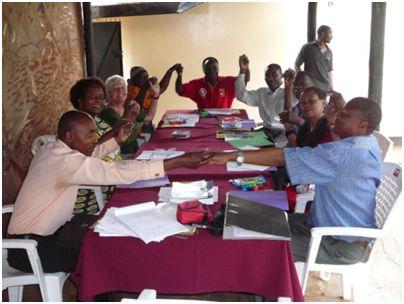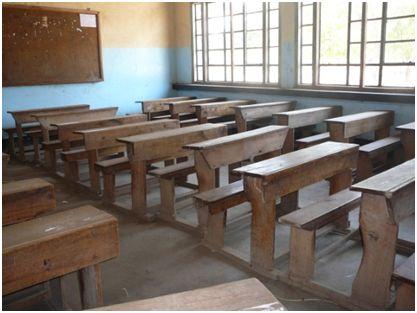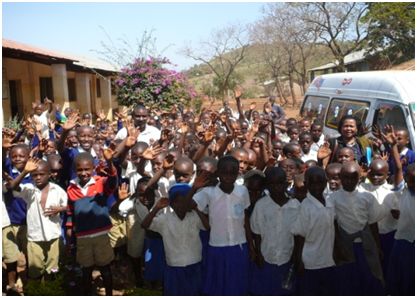Projects/moshi-tanzania
This Wiki page Contains
- Contributors Program Project Proposal Form
- NOVEMBER 2009 WORKSHOP PROPOSAL PREPARED BY TANZANIAN COMMITTEE
- Details Requested by OLPC Contributor “Community Jury” at January 8, 2010 On-Line Meeting
Project Info
[laptop.org #50418] Teaching Methods Workshop for Rural Teachers featuring XO/Sugar Constructivist Learning for Moshi, Tanzania Area [Tim Russell, Virginia/Washington DC, USA]
Project Title & Shipment Detail
Teacher Workshops for Capacity Building in Schools of Rural Moshi, Tanzania
Shipping Address #1 Tim Russell, 3003 Voyage Drive, Stafford, VA 22554 Tel 540 659 1952 Timothy Bruce Russell
Shippping Address #2 Dr Peter and Mama Lucy Renju, Second Chance Education Centre, Plot 98, Rindi Road, Moshi, Tanzania Tel 255 027 2775 4494 Peter J Renju
Number of Laptops (or other hardware) You Request to Borrow:
- April 2010 to September 2010 for Workshop Training Shipping Address #2
- 5 XO-1.5 laptops
- Additional Equipment
- 5 10 watt / 14 volt solar panels
- 3 PV Solar Panels
Team Participants
Tim and Diane Russell, timdianerussell@gmail.com, tel 540 659 1952
- Tim- Retired US Army Officer and Retired NATO officer - Assistant in Diane's Tanzania Projects
- Diane: 20 years teaching experience with 15 years at International School of Luxembourg and 7 years additional work to take high school students to community service projects in Moshi, Tanzania, Schools
Dr. Peter Renju, prenju@kicheko.com,
- Director for Tanzanian NGO Second Chance Education Centre, retired from United Bible society where he translated ancient Greek bible into modern day Kiswahili.
- The Project Committee has 10 members from the Moshi rural schools and Mama Renju is the Committee Director who operates the Honey Badger Cultural Centre.
- Secondary; Mrs. V. Mkony and Mr. M. Lema, Makaa Primary: Mr. H. Mvungi, Sango Primary; Mr. S. Macha, Komakya Secondary; Mr. E.J. Singada, Mashingia Secondary; Mrs. Delphina Iriya, Jitegemee Primary.
- With the Endorsement of: Professor Raymond S. Mosha, DePaul University, Chicago, Illinois, and Dr. Peter Renju, co-director, Second Chance Education Centre, Moshi, Tanzania.
- With the coordination of: The Kilimanjaro Regional Education Officer. Enclosure 3
Location: Second Chance Education Centre/ Honey Badger Lodge and Cultural Centre, Plot 98, Rindi Road, Msaranga, Moshi, Tanzania. Postal address: Box 8873, Moshi, Tanzania.
- Banking Information:
- Account Name: Second Chance Education Center (Tanzanian Registration Number 07/NGO/0625)
- Account Holder: Dr. Peter and Mama Lucy Renju
- Standard Chartered Bank, Moshi, Tanzania
- Communication: for Teacher Capacity Building Workshop
- Signer: Mama Lucy Renju and Co-Signer Dr. Peter Renju Second Chance Education Centre, Plot 98, Rindi Road, Moshi, Tanzania
Objectives
Project Objectives: A sustainable, cooperative teacher capacity building effort in the Moshi, Tanzania area.
- Mission Statement
- To bring together visiting international teachers with selected headmasters and teachers of primary and secondary rural schools, plus the directors of the five teaching centres which serve the area, to develop, as a team, efficient and effective XO based teaching practices based on the use of XO/Sugar collaborative learning environment and supporting technologies.
- To encourage sustainability whereby the local headmasters arrange for the participating teachers to share and demonstrate the learned pedagogical practices with colleagues at their schools and with directors of rural teacher centers, in an on-going team-building process.
- To explore ways and means to bring to the rural schools a power source for the technology of computers, voice recorders used to enhance teaching and learning; to give instruction as to the use of technology in the schools, how to access instructional programs and to continue the long-distance dialogue with visiting teachers.
- Learning Objectives
- The program participants will learn to convey knowledge in a formative as well as informative way to aid the academic success and contribute to the moral development and cultural awareness of the young children and young adults attending school in rural Moshi.
- The working language will be English, thus offering the rural teachers an opportunity to become more proficient in the language.
- Local teachers will be asked to bring samples of government exams which their students must take as well as guidelines to curricular requirements. Discussion of different teaching methods will evolve around these obligations, but the workshop will not be focused on “teaching to the test”.
- To collaborate with related NGO projects for Tanzania, such as Solar Electric Light Fund and OLPCorps Stanford (Opendo).
Plan of Action
- Familiarize ourselves with care and operation of XO-1
- Try out different ways that XO-1 could be a classroom learning tool. Perhaps OLPC has information and lessons learned that this project could use.
- Find and use existing worldwide lessons that could be used in classrooms with XO-1
- Recruit teachers from different Moshi schools to start collaboration and networking to make the most positive use of the XO-1
- Collect, document and report how the process of learning with XO-1 could be improved.
- Organize followup workshops in Tanzania
Needs and OLPC Community Engagement
Why is this project needed?
- Schools have too many students and too few teachers. Also, the schools are very spartan and often do not even have electricity. A major transformation is needed in the way learning is approached.
- Locally, in the US we will try to make contacts with Stafford County Schools to gain knowledge and assistance.
- In the greater OLPC/Sugar community? This community has the technical and educational OLPC lessons learned that we can use to avoid problems and find the right path.
- Outside the community? We have contacted the Tanzanian NGOs Second Chance Education Centre and SAIDA (help)as well as the US NGOs Friends of Tanzania and Africaid.
- Why XO: Low power machines are needed in an environment where the electrical outlets are few and far between. It appears that XO-1 can network several laptops in same class without need for audio-visual equipment enabling the teacher to roam and student clusters to self teach. We would like to have a library of shared lessons and plans for lessons. Tanzania has standardized educational achievement tests.
- Training Period: Before April, the XO equipment will prepare the project team trained for the July Workshop. The April equipment is to do "show and tells" at the more than 20 rural schools to develop ideas for the areas of most interest. We would like the XO-1 machines, but rebuilt XO-1 laptops would also be useful.
- Sharing Deliverables
- A Project URL—where you'll report specific ongoing progress:
- How will you convey tentative ideas & results back to the OLPC/Sugar community, prior to completion?
- Email and Contributor Meetings.
- How will the final fruits of your labor be distributed to children or community members worldwide?
- OLPCNews
- Will your work have any possible application or use outside our community? Yes
- If yes, how will these people be reached? We will be reporting to the Tanzanian Education Regional Director.
- Have you investigated working with nearby XO Lending Libraries or Project Groups?
- The DC Lending library may have a XO available next week.
- Quality/Mentoring
- Would your Project benefit from Support, Documentation and/or Testing people? Yes
- Teachers' input into Usability? Yes
- How will you promote your work?
- Within Tanzania with the Regional Director of Education, Through OLPC and through interested sponsoring NGOs.
- Ongoing Mentoring that will benefit you most.
- Similar project + use of XO- with audio-visual equipment
- Communication
- Email and Contributor Meetings
Timeline
- Between January and July 2010 prepare for workshop
- July 2010 run the workshop and S
- September 2010 prepare after action report
Needs and Objectives
- The teachers in the rural schools of Moshi receive low salaries and yet they walk miles to their schools to devote themselves to their students, so that they may pass the government examinations and hope that some students somehow might continue to higher education and become future professionals and leaders of Tanzania.
- The teachers themselves are hoping for recognition, renewed confidence, continued education and empowerment, goals which are difficult to obtain in their economic environment. The rural teachers teach the way they were taught: copying, rote-memory, verbal repetition, which leads to stagnation.
- During two weeks of September, 2009, the headmasters and head teachers, who form the committee for this project, the director and American facilitator visited and spoke with the staffs at more than 20 rural schools and at two teacher centers, all of whom welcomed and yearned for assistance.
- The time-honored method of teaching used in these schools does not allow for the learning of valid conversation, written expression, creative thought and confidence which could instill in students the leadership qualities needed for Tanzanian society of the 21st century. Good, highly motivated teachers, look for professional development opportunities which can impact their teaching approaches.
Project Description
- This project offers an organized week-long residential conference/workshop, bringing together local teachers with international teachers in a team-building exercise would provide such a professional development opportunity for all.
- The teams would tackle the challenges of a very large student-teacher ratio, a lack of adequate books, paper, pens, technology, even electricity. They work in discussion with the rural teachers to finding alternative ways of conveying knowledge and contributing to the moral development of young adults.
- It must be recognized that the goal is neither to impose western culture nor to usurp the existing valued traditions of the people of the region. A prerequisite for the visiting teachers would be the reading of the book, The Heartbeat of Indigenous Africa; A Study of the Chagga Educational System by Raymond Sambuli Mosha, a recognized scholar. Dr. Peter Renju, also an international scholar, and Mama Lucy Renju, a community leader, will introduce the visitors to background information as to their culture and customs. The fact that both groups will reside at Honey Badger Lodge further enhances team-building, conversation and interchange of ideas and culture.
- Incentives and Sustainability
- Recognizing the difficult financial situation of the rural teachers, a small stipend will be offered for travel and attendance; the room and board paid for at the week-long residential workshop.
- It is hoped that teachers can be provided with laptop computers and other teaching aids. “One laptop per teacher” could ideally set the stage for “one laptop per child”.
- Headmasters will arrange for participating teachers to share new pedagogical ideas and techniques with their colleagues at their schools and/or with directors of teachers’ centers. Follow-up reports by the participating teacher as to adaptation and impact of new skills will be written and sent to Mama Lucy Renju, with copies forwarded to Diane Russell, committee members, Professor Raymond Mosha, and, if appropriate, the Regional Education Officer. Headmasters will follow a fair selection process for workshop participants and will allow time-off without repercussion.
- A certificate of participation and recognition by the Regional Education Officer will be awarded to each teacher.
- A library of English language books and reference materials will be established at Honey Badger Cultural Centre and continually developed by contributions of resources brought by visiting teachers or sent by international schools.
Size/Scale/Selection
- The workshop will be designed on a small-scale of approximately 10 visiting teachers to 20 local teachers to allow for residency at Honey Badger Lodge and the closeness and seriousness of conversation and training. Practice lessons and experimental implementation of different methodology will be taught to the students of Second Chance Education Centre. Ideally, the timing would allow for visits to the other rural schools and actual classroom observation.
Mama Lucy Renju will work with the heads of schools as to the application and selection process of local teachers.
- Mrs. Diane Russell will work with sponsors/supportive NGO’s , recommendations of directors, to advertise, recruit, and select visiting teachers in coordination with various international schools and universities.
Costs and Funding
- The Second Chance Education Centre is a registered Tanzanian NGO. Funding is needed to provide for transportation of the local teachers to the Second Chance Education Centre from their schools and for food and board at Honey Badger Lodge. If a complete residential stay is offered the cost is approximately $25 (U.S.) per day five to six days.
- The cost of $25 (US) per day for room and board also applies to the visiting international teachers. They must find their own funding sources. Round-trip airfare and airport pick-up and return for visiting teachers might be covered by their individual schools as part of a professional development budget or through cost-sharing with sponsors of this project.
- In addition, funding for basic pedagogical supplies for each subject area, books on methodology, portable white boards, notebooks, etc. is necessary.
It is estimated that US $ 5000 would be needed to initiate and fund the project. This does not include technology, such as computers and projectors.
For further information: Diane Busher Russell Lucy Renju: Chance2educate@yahoo.com 3003 Voyage Drive Honeybadger@africamail.com Stafford, Virginia 22554 Telephone: 255 027 275 4494 USA Home phone: 540 659 1952 Mobile phone: 540 604 7795 Diane.Busherrussell@gmail.com


